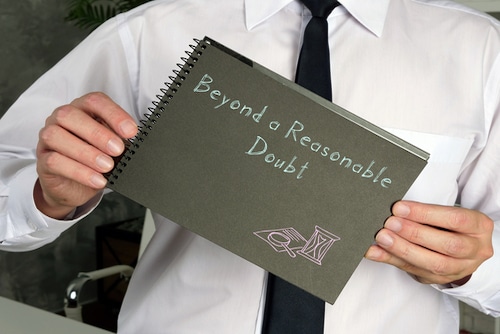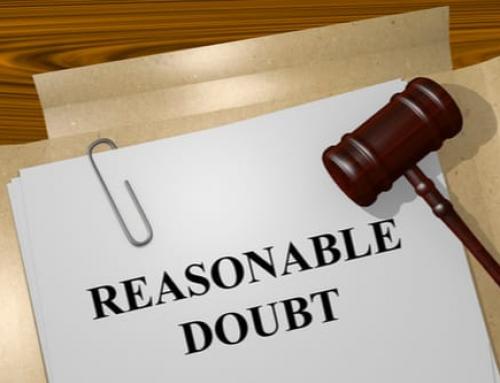As a criminal defendant in Pennsylvania, you are entitled to the presumption of innocence. You are innocent until proven guilty; and, to prove your guilt, prosecutors must establish that you committed a crime “beyond a reasonable doubt.”
This means that if you can create “reasonable doubt” about whether you committed a crime, you are entitled to walk free. You don’t need to prove that you are innocent—all you need to do is prevent the prosecution from proving that you are guilty.
Preventing the Prosecution from Meeting Its Burden of Proof
But, while the prosecution has the burden of proof, as a defendant you can still face substantial—and in some cases insurmountable—hurdles. Prosecutors in Pennsylvania regularly secure convictions, and in many ways the system is set up to favor the government. Unless you negotiate a plea deal or are able to get your charges dismissed prior to trial, you will need to try to prevent the prosecution from meeting its burden of proof in court.
So, how do you establish “reasonable doubt” in Pennsylvania?
In a recent article, we covered what constitutes “reasonable doubt” in a Pennsylvania criminal case, and we provided an overview of the procedures for seeking an acquittal during trial. Here is an in-depth look at five ways a criminal defense lawyer may be able to establish reasonable doubt in court:
1. Exposing Flaws in the Prosecution’s Case
To prove that a defendant committed a crime, prosecutors must prove each “element” of the offense. If prosecutors cannot prove all elements beyond a reasonable doubt, then they cannot secure a conviction. With this in mind, in many cases, establishing reasonable doubt will involve focusing on one or more of the specific elements of the crime in question. If you can show that the prosecution’s case is flawed because prosecutors have not adequately addressed all of the elements, this can be enough to avoid a conviction.
2. Presenting Contradictory Evidence
As a defendant, you have the right to present your own evidence in court. Along with challenging the prosecution’s evidence (as discussed below), if you can present your own evidence that calls the prosecution’s case into question, this could raise a reasonable doubt in the minds of the jury. This could be evidence of an alibi, evidence that someone else committed the crime, or evidence that the alleged crime never actually occurred.
3. Challenging the Prosecution’s Evidence
When prosecutors present their evidence at trial, they will present it in the light that is most favorable to their case. When it is your turn to present your defense, you can challenge the prosecution’s evidence by arguing that it doesn’t actually prove what prosecutors allege. You (or your defense lawyer) may also be able to challenge the prosecution’s evidence by showing that it is inauthentic, unreliable, or otherwise inadequate to support a finding of guilt beyond a reasonable doubt.
4. Challenging the Prosecution’s Witnesses
When presenting your defense, you can also challenge the prosecution’s witnesses. You can challenge their testimony by cross-examining them or presenting other evidence or witnesses, and you can challenge their credibility by showing that they have a criminal history, a history of lying, or a conflict of interest. Showing jurors that they can’t trust the prosecution’s witnesses—and therefore can’t trust the prosecution—can be an effective defense strategy in many cases.
5. Keeping the Prosecution’s Evidence Out of Court
Another option is to keep the prosecution’s evidence out of court altogether. If police or prosecutors have violated your constitutional rights, then the prosecution may be prohibited from using its evidence against you—provided that you raise the issue effectively. Without adequate evidence, the prosecution will be unable to meet its burden of proof.
Using Reasonable Doubt Before Trial
While establishing reasonable doubt during trial can protect you against a guilty verdict, establishing reasonable doubt before trial could keep your case out of court entirely. For example, depending on the facts and circumstances of your case, your defense lawyer may be able to:
- Get Prosecutors to Drop Your Criminal Charges – If your defense lawyer can show that the prosecution’s evidence is lacking prior to trial, your defense lawyer may be able to convince prosecutors to drop your criminal charges. But, this will require a strong showing that the prosecution doesn’t have the admissible evidence it needs to convict you.
- Negotiate a Favorable Plea Bargain – Raising questions about the prosecution’s case can also be an effective strategy for negotiating a favorable plea bargain. If prosecutors are not convinced that they will be able to secure a conviction, they will be more likely to agree to a favorable plea.
- File a Motion to Dismiss Your Criminal Charges – If prosecutors won’t agree to drop your charges even though the evidence is lacking, your lawyer can file a motion to dismiss in court. If your lawyer can convince the judge that taking your case to trial would be a waste of time and the court’s resources, this will allow you to avoid putting your fate in the hands of the jury.
It is important to know that you may have other options as well. For example, if you are a first-time offender, you may qualify for one of Pennsylvania’s diversion programs. If you qualify for one of these programs—and if you complete the program successfully—you will be able to avoid a conviction even if prosecutors have the evidence they need to prove your guilt beyond a reasonable doubt. To make sure you consider all of your options, you should discuss your case with an experienced defense lawyer.
Contact Us for a Free and Confidential Criminal Defense Consultation
Are you facing criminal charges in Pennsylvania? If so, we strongly encourage you to contact us for a free consultation. Philadelphia criminal defense lawyer Brian Fishman will thoroughly evaluate your case and determine what options you have available. To schedule an appointment as soon as possible, call 267-758-2228 or tell us how we can reach you online now.






